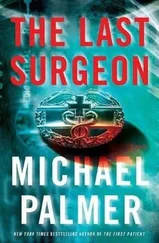Michael Palmer - The Society
Здесь есть возможность читать онлайн «Michael Palmer - The Society» весь текст электронной книги совершенно бесплатно (целиком полную версию без сокращений). В некоторых случаях можно слушать аудио, скачать через торрент в формате fb2 и присутствует краткое содержание. Жанр: Триллер, на английском языке. Описание произведения, (предисловие) а так же отзывы посетителей доступны на портале библиотеки ЛибКат.
- Название:The Society
- Автор:
- Жанр:
- Год:неизвестен
- ISBN:нет данных
- Рейтинг книги:5 / 5. Голосов: 1
-
Избранное:Добавить в избранное
- Отзывы:
-
Ваша оценка:
- 100
- 1
- 2
- 3
- 4
- 5
The Society: краткое содержание, описание и аннотация
Предлагаем к чтению аннотацию, описание, краткое содержание или предисловие (зависит от того, что написал сам автор книги «The Society»). Если вы не нашли необходимую информацию о книге — напишите в комментариях, мы постараемся отыскать её.
The Society — читать онлайн бесплатно полную книгу (весь текст) целиком
Ниже представлен текст книги, разбитый по страницам. Система сохранения места последней прочитанной страницы, позволяет с удобством читать онлайн бесплатно книгу «The Society», без необходимости каждый раз заново искать на чём Вы остановились. Поставьте закладку, и сможете в любой момент перейти на страницу, на которой закончили чтение.
Интервал:
Закладка:
Halliday concluded his remarks and returned to his seat accompanied by generous, appreciative applause. Will remained in his seat for several seconds after his name was called out. The night was nearly over, and in truth, from what he could tell, he hadn’t accomplished a damn thing. It wasn’t as if he had mortally wounded himself or the Hippocrates Society and its goals, but he certainly hadn’t helped to promote them, either. He carried the file cards to the podium, then took a few more seconds to scan the crowd. It was, he realized, the first time he had made any real contact with them.
Yes, of course, facts, Halliday had said. That will be refreshing. . Dr. Grant, I intend to be civil with you only as it suits my purposes. .
Suddenly, with barely a hint from inside himself that he was going to do it, Will took the stack of note cards and set them aside. Then he lifted the microphone from its stand and carried it to the side of the podium.
“Mr. Halliday has spoken a great deal tonight about statistics,” he began, with no clear idea where he was headed. “I took biostatistics in medical school. I was hardly a legend in the course, but I did pass. One thing I learned was that well-designed, truly meaningful, unflawed clinical studies are about as rare as. . as a day without dozens and dozens of conflicts between physicians of every specialty and the insurance companies charged with deciding what they can and cannot do for their patients, and how much they will be paid for doing it. Put another way, if you happen to be the person being shipped from one ER to another because your HMO doesn’t perceive your illness to be life-threatening, statistics that say you’ll make it through your crisis without dying don’t mean a hell of a lot.
“In addition to biostatistics, I also took a course entitled ‘The Art and Practice of Medicine.’ That one I did do quite well in. Basically, what we learned about in the art and practice of medicine was people-not the kind of actors we saw in that movie, scrubbed and healthy and happy, but people who are sick. . or injured. . or confused-real people often at the very crossroads of their lives. People like Roy, a ten-year-old boy hospitalized by his pediatrician for profound malnutrition. Fifty-four pounds he weighed. It took an extensive, delicate evaluation, but finally the diagnosis of anorexia was made-an unusual though not unheard of occurrence in a boy of this age. Tube feedings and intensive family therapy helped the pediatrician and psychiatrist and nurses to save his life. Imagine if this was your child and he had died. Imagine the devastation to the survivors. But doctors doing what they had studied and trained to do kept that nightmare from happening. The point? Well, through a clerical mistake, Roy’s discharge diagnosis was listed as anorexia, not malnutrition. Same boy, same illness, same miraculous outcome, different word. Alas, whereas the family’s HMO would have paid for the lifesaving hospitalization if the diagnosis was written as malnutrition, the bureaucrats who decide such things adamantly and forever refused to pay for anorexia-a diagnosis they considered psychiatric, and therefore not covered by the family’s plan.
“Recently, Karen, a registered nurse in a hospital not far from here, with fifteen years of unblemished service, committed a fatal medication error. An investigation concluded that she was exhausted and harried because corporate cost-cutting had left her floor woefully short of registered nurses, and she had been picking up extra shifts and performing extra duties on those shifts. Do you think she or the family of the dead patient want to hear about statistics and dollars saved by substituting LPNs and aides for RNs?”
There was no movement at all among the hundreds in the audience. No sound. Will cleared his throat, then took a sip of water. Seated in the center of the fourth row, Gordon Cameron made eye contact and almost imperceptibly nodded. Will plunged ahead, feeling like a halfback who had broken through the line and was now running free in the open field.
“Last week a fifty-three-year-old loving, caring internist by the name of Mark White was chastised and threatened by a non-MD managed-care official for ordering excessive diagnostic tests on his patients. That call was the final straw for this physician, who had never been sued, who did volunteer work at a free clinic, who was a past chief of medicine at his hospital, and whose filled-to-overflowing practice was as totally devoted to him as he was to it. He spoke briefly to his staff and to the patients in his waiting room. Then he put on his coat and left. . Quit. . Just like that. . Good-bye, Dr. White.
“A survey by the Western Journal of Medicine recently reported that the average primary-care physician spends forty minutes a day dealing with managed-care hassles, mostly around referral and prescription issues. Since there are around one hundred thirty-seven thousand primary-care docs with managed-care contracts, that translates into more than twenty-one million hours of patient-physician interaction lost to those hassles. Using the average three visits per patient per year, and an overly generous twenty minutes per visit, more than twenty-one million patients could have had access to a primary-care physician during the time those docs are now spending on managed-care issues.”
Will paused to let the notion sink in. He still had no clear idea how he was going to wrap things up, but he sensed that desperation had led him to the path he should have been traveling all evening-that medicine must be, at its core, always and ever, about each individual patient. He caught movement out of the corner of his eye, and initially thought that either Roselyn Morton was coming over to give him the hook or Boyd Halliday was about to turn the forum into a free-for-all. Instead, Tom Lemm approached and handed him a typed sheet.
“I think this might be just what you need,” he whispered.
Will scanned the paragraph and immediately understood.
“So, where does this leave us?” he asked the crowd. “Fee-for-service has been deemed too expensive, and managed care is too, well, managed. Under the one system, lots of doctors were felt to be making too much money. Under the other, managed-care executives are pocketing tens if not hundreds of millions, while searching daily for ways to further cut services and payments, as well as ways to weed out from their coverage those who are most in need of proper health care-the old, the infirm, and the poor. In Europe and Canada, nationalized health care has been at least as successful as the system we have in place. If nothing else, all of the citizens of those countries have access to care. Whether it is their system, or a hybrid of theirs with our own, changes are needed and needed desperately.
“I want to close with this note that we received at the Hippocrates Society and that my trusted cohort Dr. Tom Lemm just produced for me. It’s from a man who works in an auto-body shop north of Boston-one of those regular guys I was talking about. I seriously doubt we’ll ever be seeing Vic Kozlowski in any promotional videos. He doesn’t suffer from a dramatic, life-threatening illness. But believe me, Vic has something to say to all of us gathered here tonight. So here he is, in his own words.”
For emphasis more than any physical need, Will cleared his throat again and took another sip of water.
“I don’t think it’s really appropriate for my doctor to do, Vic writes, but every time I visit him he tells me about how the HMOs are dictating every move he makes and ruining his practice. Then he tells me he shouldn’t even be saying such things because he might get in trouble. It makes me so sad. He is a wonderful doctor, but he’s scared to speak up against the HMOs.
Читать дальшеИнтервал:
Закладка:
Похожие книги на «The Society»
Представляем Вашему вниманию похожие книги на «The Society» списком для выбора. Мы отобрали схожую по названию и смыслу литературу в надежде предоставить читателям больше вариантов отыскать новые, интересные, ещё непрочитанные произведения.
Обсуждение, отзывы о книге «The Society» и просто собственные мнения читателей. Оставьте ваши комментарии, напишите, что Вы думаете о произведении, его смысле или главных героях. Укажите что конкретно понравилось, а что нет, и почему Вы так считаете.












